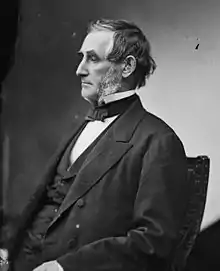John Robbins | |
|---|---|
 | |
| Member of the U.S. House of Representatives from Pennsylvania's 4th district | |
| In office March 4, 1849 – March 3, 1853 | |
| Preceded by | Charles J. Ingersoll |
| Succeeded by | William H. Witte |
| Member of the U.S. House of Representatives from Pennsylvania's 3rd district | |
| In office March 4, 1853 – March 3, 1855 | |
| Preceded by | Henry D. Moore |
| Succeeded by | William Millward |
| Member of the U.S. House of Representatives from Pennsylvania's 5th district | |
| In office March 4, 1875 – March 3, 1877 | |
| Preceded by | Alfred C. Harmer |
| Succeeded by | Alfred C. Harmer |
| Personal details | |
| Born | 1808 Bustleton, Pennsylvania, U.S. |
| Died | April 27, 1880 (aged 71–72) Philadelphia, Pennsylvania, U.S. |
| Political party | Democratic Party |
| Spouse | Tacy W. Robbins |
| Alma mater | Gunmere Academy |
| Profession | manufacturer politician |
John Robbins (1808 – April 27, 1880) was a Democratic member of the U.S. House of Representatives from Pennsylvania.
Early life and career
John Robbins was born in Bustleton, Pennsylvania, (now a part of Philadelphia), near Lower Dublin Township, Pennsylvania. He was a student at the Gunmere Academy in Burlington, New Jersey. He moved to Philadelphia in 1836 and engaged in the manufacture of steel. He was a member of the board of commissioners of the district of Kensington, Pennsylvania, and served as president several years.
Political career
Robbins was elected as a Democrat to the Thirty-first, Thirty-second congresses, representing the fourth district of Pennsylvania from March 4, 1849, to March 3, 1853; and to the Thirty-third Congress representing the third district from March 4, 1853, to March 3, 1855. He declined to be a candidate for renomination in 1854, and was an unsuccessful candidate for the office of the Mayor of Philadelphia in 1860. He resumed the steel manufacturing business and held several municipal offices.
Again elected to the Forty-fourth Congress, for the fifth district, Robbins served from March 4, 1875, to March 3, 1877; but declined to be a candidate for renomination in 1876.[1]
Later life and death

Robbins was a member of the board of education and served as president for many years, as well as president and director of the Kensington National Bank.[2] He died in Philadelphia, Pennsylvania, on April 27, 1880, and was interred at Laurel Hill Cemetery.[3]
References
![]() This article incorporates public domain material from the Biographical Directory of the United States Congress
This article incorporates public domain material from the Biographical Directory of the United States Congress
- ↑ "John Robbins". Biographical Directory of the United States Congress. Retrieved November 16, 2013.
- ↑ John Robbins. The National Banks of the United States. 1864. Retrieved November 17, 2013.
- ↑ Where They're Buried
External links
- United States Congress. "John Robbins (id: R000301)". Biographical Directory of the United States Congress.
- John Robbins entry at The Political Graveyard